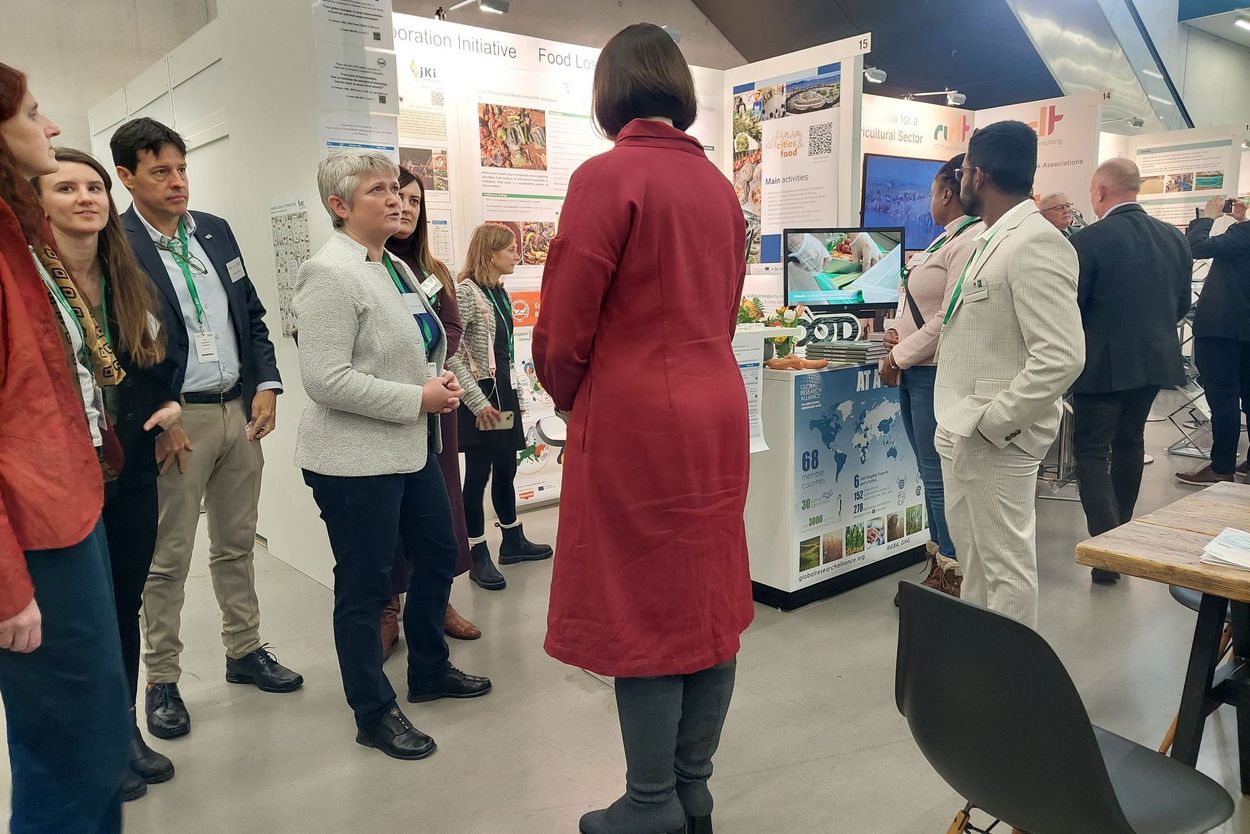“Reducing food loss and waste” was one of the central themes of the 16th Global Forum of Food and Agriculture (GFFA), which took place in Berlin from January 18th to 20th, 2024. Of course, our Collaboration Initiative Food Losses and Waste of the „Meeting of Agricultural Chief Scientists of G20 States“ (MACS-G20) could not be missed. Together with cooperation partners, we held an Expert Panel and organized an exhibition stand in the Innovation Forum.
Our goal was to present our work at a global, regional and local level and to give visitors insights into concrete options for action to reduce food loss and waste. The following cooperation partners and colleagues supported these activities:
- Chanjief Chandrakumar from thinkstep_anz with context to climate impact and representing Global Research Alliance on Agricultural Greenhouse gases (GRA) in relation to food loss in early supply chain
- Gustavo Porpino representing Brazilian Agricultural Research Corporation (Embrapa) and their City & Food project targeting circular economy in urban food chain
- Sharon Mada from Thünen Institute of Market Analysis focusing on food waste from street markets and households in Harare, Zimbabwe
- Christina Müller-Blenkle and Camilla Albrecht from Julius Kühn-Institute for ecological chemistry, plant analysis and stored product protection representing the AVoiD project
- Christina Strotman from FH Muenster, Institute of Sustainable Nutrition and Food Production (ISuN) representing the LOWINFOOD project
- María Ángeles Fernández-Zamudio from Instituto Valenciano de Investigaciones Agrarias (IVIA) reporting about persimmon harvest losses in Spain
- Thomas Noack from Thünen Institute of Baltic Sea Fisheries related to reduction of by-catch
- Angela Frigo and Anna Friederitz from European Food Banks Federation
- Alexander Liedke from Lidl Dienstleistung GmbH & Co. KG related to a project on fruit and vegetables losses
- Malin Büttemeier and Lia Orr from Thünen Institute of Market Analysis focusing on the Center for Out-of-Home Catering
- Manuela Kuntscher and Thomas Schmidt from Thünen Institute of Market Analysis representing the project Monitoring food waste in wholesale and retail)
- Stefan Lange, research director at Thünen Institute, as moderator of the expert panel
- Martin Banse, head of Thünen Institute of Market Analysis, logistical support and Simon Bonse, IT-administrator of Thünen Institute of Market Analysis, as technical support
At the start of the GFFA Innovation Forum, the Parliamentary State Secretary at the BMEL, Ms Claudia Müller, visited our stand. We were able to present the activities on display from countries from A like Australia to Z like Zimbabwe. Of particular interest were a plate balance scale from the LOWINFOOD project, grain pests to watch and listen to from the AVoiD project, a poster about banana losses in Sri Lanka and a video about selective fishing nets to reduce by-catch in the Baltic Sea.
Our expert panel “From global strategies to local implementation in preventing food loss and food waste” combined options for action to reduce food loss and waste at an international, regional and local level with concrete examples from Germany, Brazil and Zimbabwe under the motto “Think globally, act locally”. The approximately 90 participants contributed their own experiences to the lively discussion.
Felicitas Schneider gave a keynote address at the expert panel „From farm to food donation. How to maximise the potential of preventing harvest losses to ensure food security?“ organized by the European Food Banks Federation. Exciting practical reports from Chris Hill from FoodCloud in Ireland, and Adolfo Villafiorita from Shair.Tech from Italy were supplemented in the discussion with the political experiences of Eva Sali from Copa-Cogeca at the European level. Rosa Rolle, food loss and waste team leader at the United Nations Food and Agriculture Organization, concluded the panel with an inspiring summary. Digital solutions support the forecasting of needs, but also donations and redistribution, making an important contribution to reducing overproduction and losses in primary production. However, this support must be accepted and implemented in daily use through trust and cooperation between the actors involved. This means that further unexplored potential of digitalization as well as food surpluses can be better exploited in the future.
We would like to thank everyone involved for their valuable contributions! Further information about the two specialist panels (including selected presentations and links to the video recordings) and our stand can be found here in English.
Contact persons:
Felicitas Schneider, Thünen Institute of Market Analysis





